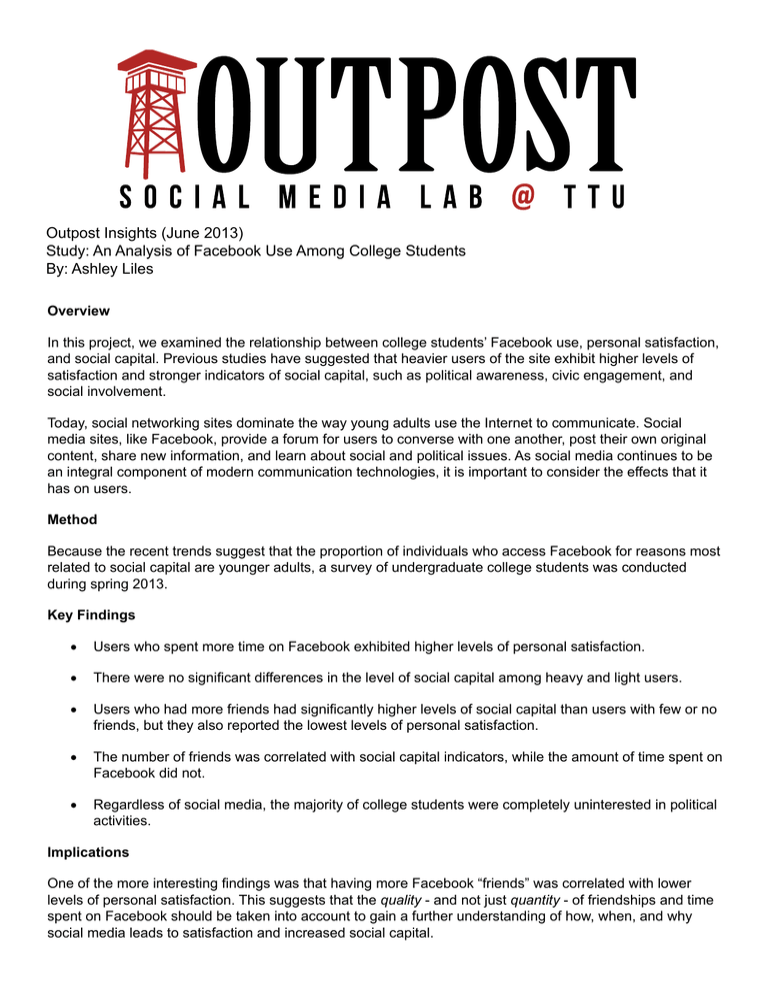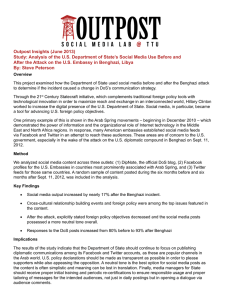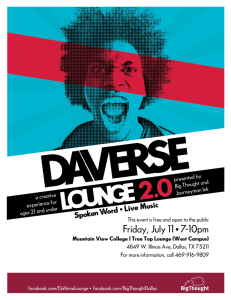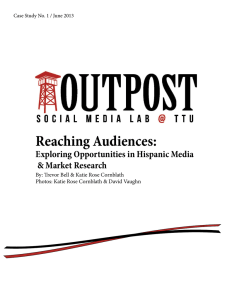Outpost Insights (June 2013) By: Ashley Liles
advertisement

Outpost Insights (June 2013) Study: An Analysis of Facebook Use Among College Students By: Ashley Liles Overview In this project, we examined the relationship between college students’ Facebook use, personal satisfaction, and social capital. Previous studies have suggested that heavier users of the site exhibit higher levels of satisfaction and stronger indicators of social capital, such as political awareness, civic engagement, and social involvement. Today, social networking sites dominate the way young adults use the Internet to communicate. Social media sites, like Facebook, provide a forum for users to converse with one another, post their own original content, share new information, and learn about social and political issues. As social media continues to be an integral component of modern communication technologies, it is important to consider the effects that it has on users. Method Because the recent trends suggest that the proportion of individuals who access Facebook for reasons most related to social capital are younger adults, a survey of undergraduate college students was conducted during spring 2013. Key Findings • Users who spent more time on Facebook exhibited higher levels of personal satisfaction. • There were no significant differences in the level of social capital among heavy and light users. • Users who had more friends had significantly higher levels of social capital than users with few or no friends, but they also reported the lowest levels of personal satisfaction. • The number of friends was correlated with social capital indicators, while the amount of time spent on Facebook did not. • Regardless of social media, the majority of college students were completely uninterested in political activities. Implications One of the more interesting findings was that having more Facebook “friends” was correlated with lower levels of personal satisfaction. This suggests that the quality - and not just quantity - of friendships and time spent on Facebook should be taken into account to gain a further understanding of how, when, and why social media leads to satisfaction and increased social capital. About the Author Ashley Liles is a recent graduate of the College of Media & Communication’s professional master’s program. This research was conducted as part of her Master’s Report project under the supervision of Dr. Todd Chambers. About The Outpost Social Media Lab @ TTU The Outpost Social Media Lab @ TTU is the College of Media & Communication’s center for the study of new media. The lab produces professional insights and analysis, hosts training seminars and workshops, supports project implementation for classes and clients, engages in community outreach, and conducts applied and basic research in social, online, and digital media. The Outpost features a world-class social media command center where undergraduate and graduate students can conduct live monitoring of news and events to provide real time analysis of public sentiment and reaction across the social web, as well as engage with audiences and curate content. The Outpost provides College of Media & Communication students with real-world experience in the growing field of social media listening and engagement. The lab also provides data collection services for academic research in one of the fastest growing areas of media and communication scholarship. Learn more at: http://www.depts.ttu.edu/comc/outpost/






